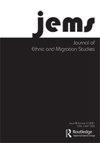Challenging the Muslimification of Muslims in research on ‘liberal democratic values’: why culture matters beyond religion
IF 2.8
1区 社会学
Q1 DEMOGRAPHY
引用次数: 0
Abstract
This study critiques the use of ‘Muslim’ as an analytic category and overfocus on religiosity as an explanatory variable in studies on conflicts between Muslims and national majorities over ‘liberal democratic values’. We call this tendency the Muslimification of Muslims. We demonstrate how this research reproduces and reinforces stereotypes drawn from dominant resonant public debates. To challenge these assumptions, we turn the research inquiry around so that ‘Muslim’ and religiosity become objects not tools for analysis. Revisiting the EurIslam survey data-set, explicitly designed for studying socio-cultural distances between Muslims and majorities, we examine boundary construction over ‘liberal democratic values’. For Muslims, first, we test for differences between four ethnonational family origin groups – Ex-Yugoslavians, Moroccans, Turks, Pakistanis- and second, for the explanatory power of religiosity compared to non-religious cultural variables. Findings are clear-cut: family ethnonational origin matters and there are different group trajectories of acculturation; religiosity has a very modest impact and much less than self-identification with settlement-country which pushes in the opposite acculturative direction. Simply put, regarding the construction of differences over ‘liberal democratic values’, not all Muslims are the same, and it is not all about practicing Islam. It is time for a re-think and a de-Muslimification of academic research.在“自由民主价值”研究中挑战穆斯林的穆斯林化:为什么文化比宗教更重要
这项研究批评了将“穆斯林”作为一个分析范畴,以及在研究穆斯林与民族多数派之间的冲突而不是“自由民主价值观”时,过度关注宗教虔诚作为一个解释变量的做法。我们称这种趋势为穆斯林的穆斯林化。我们展示了这项研究是如何再现和强化从主流共鸣公共辩论中得出的刻板印象的。为了挑战这些假设,我们将研究调查反过来,使“穆斯林”和宗教信仰成为分析的对象而不是工具。回顾EurIslam调查数据集,明确设计用于研究穆斯林和多数人之间的社会文化距离,我们考察了“自由民主价值观”的边界构建。对于穆斯林,首先,我们测试了四个民族家庭起源群体(前南斯拉夫人、摩洛哥人、土耳其人、巴基斯坦人)之间的差异;其次,与非宗教文化变量相比,我们测试了宗教虔诚度的解释力。研究结果非常明确:家庭民族起源很重要,并且有不同的群体文化适应轨迹;宗教信仰的影响非常有限,远远小于对定居国家的自我认同,后者推动了相反的文化融合方向。简单地说,关于“自由民主价值观”差异的构建,并不是所有的穆斯林都是一样的,也不都是关于实践伊斯兰教的。是时候对学术研究进行反思和去穆斯林化了。
本文章由计算机程序翻译,如有差异,请以英文原文为准。
求助全文
约1分钟内获得全文
求助全文
来源期刊

Journal of Ethnic and Migration Studies
Multiple-
CiteScore
7.80
自引率
9.10%
发文量
157
期刊介绍:
The Journal of Ethnic and Migration Studies (JEMS) publishes the results of first-class research on all forms of migration and its consequences, together with articles on ethnic conflict, discrimination, racism, nationalism, citizenship and policies of integration. Contributions to the journal, which are all fully refereed, are especially welcome when they are the result of original empirical research that makes a clear contribution to the field of migration JEMS has a long-standing interest in informed policy debate and contributions are welcomed which seek to develop the implications of research for policy innovation, or which evaluate the results of previous initiatives. The journal is also interested in publishing the results of theoretical work.
 求助内容:
求助内容: 应助结果提醒方式:
应助结果提醒方式:


